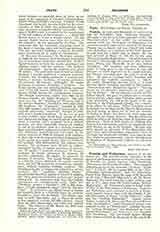

Praxeas, an early anti-Montanist, is known to us only by Tertullian‘s book “Adversus Praxean”. His name in the list of heresies appended to the “De Prmscriptionibus” of that writer (an anonymous epitome of the lost “Syntagma” of Hippolytus) is a correction made by some ancient diorthotes for Noetus. Praxeas was an Asiatic, and was inflated with pride (says Tertullian) as a confessor of the Faith because he had been for a short time in prison. He was well received at Rome (c. 190-98) by the pope (Victor, or possibly Zephyrinus). The latter pope had decided to acknowledge the prophetic gifts of Montanus, Prisca, and Maximilla (if we may believe Tertullian). The intention had been sufficiently public to bring peace to the Churches of Asia and Phrygia—so much depended on the papal sanction; but Praxeas prevailed upon the pope to recall his letter. He came to Carthage before Tertullian had renounced the Catholic communion (c. 206-8). He taught Monarchian doctrine there, or at least doctrine which Tertullian regarded as Monarchian: “Patrem cruci fixit; Paraclitum fugavit “—”Having driven out the Paraclete [Montanus], he now crucified the Father”. He was refuted, evidently by Tertullian himself, and gave an explanation or recantation in writing, which, when Tertullian wrote several years afterwards, was still in the hands of the authorities of the Carthaginian Church, the “carnal”, as he affects to call them. When Tertullian wrote he himself was no longer in the Church; Monarchianism had sprung up again, but he does not mention its leaders at Rome, and directs his whole argument against his old enemy Praxeas. But the arguments which he refutes are doubtless those of Epigonus and Cleomenes. There is little reason for thinking that Praxeas was a heresiarch, and less for identifying him with Noetus, or one of his disciples. He was very likely merely an adversary of the Montanists who used some quasi-Monarchian expressions when at Carthage, but afterwards withdrew them when he saw they might be misunderstood. On the identification by Hageman of Praxeas with Callistus, see Monarchians.
JOHN CHAPMAN

